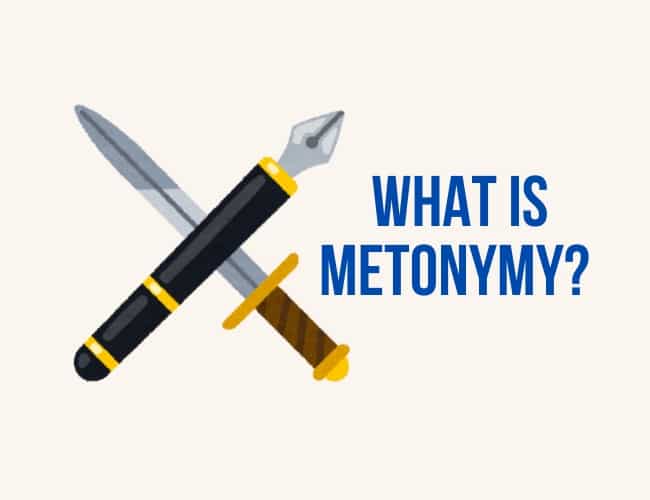If you've heard the saying, “The pen is mightier than the sword,” then you've experienced metonymy. But what is metonymy and how is it used in writing? Let's look at the definition, types, and examples of metonymy.

Language is fascinating. We use it all the time, but most people don't analyze it. Ask the average person about verb conjugation, the pluperfect, or adjective order, and you're likely to get blank stares. Yet, native speakers use the language correctly without knowing (or caring about) technical terms.
The same thing goes for figures of speech. We use them all the time, but rarely know what they are called.
But you're reading this article because you want to know more than the average person. Probably, you're a writer who wants to improve your writing, and you believe a greater understanding of figures of speech will help you improve your writing. (By the way, you're correct, if for no other reason than this additional knowledge increases your awareness.)
Which brings us to metonymy.
It's a figure of speech that we come across every day, even if we don't take the time to analyze it. For example, you may have heard the adage, “The pen is mightier than the sword.” (From the play Cardinal Richelieu by Edward Bulwer Lytton) If we take that literally, it's a ridiculous statement. But we understand that “pen” and “sword” refer to written words and military aggression, respectively.
Perhaps you've asked a friend, “Can you give me a hand?” If so, then you understand how metonymy works: you don't want a hand; you want help.
But in case you want to know the technical details or need to write a definition and give examples for English class, let's look into metonymy.
What is metonymy?
In simple terms, metonymy is when a writer uses one word to stand for a larger concept. If I say, “Will you give me a hand?” I'm not asking you to amputate your hand. I'm asking you to use your hands (or legs and maybe brain) to help me.
Metonymy is a figure of speech that draws a connection between one object and another, making one thing stand in for another. Merriam-Webster defines metonymy as “a figure of speech consisting of the use of the name of one thing for that of another of which it is an attribute or with which it is associated (such as ‘crown' in ‘lands belonging to the crown').” Another definition is “the act of referring to something using a word that describes one of its qualities or features. (Cambridge Dictionary)
As is often the case, dictionary definitions don't give us all the information. So, let's continue.
Origin of metonymy
The word metonymy comes from Ancient Greek μετωνυμία (metōnumía) “a change of name.”
Individual metonyms (instances of metonymy) arise when we make a connection between two things by association. For example, we do things with our hands, so asking someone to give us a hand means we are asking them to do something for us, to help us. We hear with our ears, so Shakespeare's line from Julius Caesar, “Friends, Romans, countrymen, lend me your ears,” is a request for the assembled crowd to listen and pay attention.
We do this regularly with locations for the people or organizations located there, body parts for the actions they perform, and clothing or accoutrements for the people who wear them. For example, the White House stands in for the President of the United States and his staff; Downing Street substitutes for the British Prime Minister; Hollywood refers to the film industry.
We've already seen examples with body parts. Another one would be “beat feet” to movement from one place to another because we use our feet for locomotion. “Boots on the ground,” while potentially literal, really means the people who wear those boots.
Types of metonymy
Because language is rarely simple, one discussion around metonymy is how broadly we should apply the term. Some people use the term narrowly to refer only to substitutions by association. Others include different relationships and figures of speech as subsets of metonymy.
Synecdoche
Synecdoche is a figure of speech that also substitutes one thing for another. The difference from metonymy is that synecdoche substitutes a part for the whole or the whole for a part. The naval command “all hands on deck” and the phrase “give one's hand in marriage” are synecdoche because the part (hand) stands for the whole person. It's different from “boots” because boots are not a part of the body.
On the other hand, using “mortals” to refer to human beings is a whole for the part because other creatures are also mortal. So Puck's (Robin Goodfellow) line from A Midsummer Night's Dream, “Lord, what fools these mortals be!” is synecdoche because he uses the broad term to refer to the human beings in the situation.
Metalepsis
Metalepsis is double metonymy, i.e., we have to understand two metonyms for it to make sense. My father used to talk about drivers having a “lead foot.” The first metonym uses “lead,” a heavy metal, to refer to weight and the idea of it pressing down on something. We use our foot to press down on the gas pedal in our cars, so “foot” refers to the act of giving the engine gas so the car moves. Thus, having a lead foot means someone depresses the gas pedal further than necessary, making the car go faster than it should (or is legal). Someone with a lead foot drives too fast.
Metaphor
While a metaphor relies on substituting the name of one thing for another, it is not metonymy because there is no association between the two objects.
Why use metonymy?
Metonyms make our writing more memorable. In poetry and prose, metonymy can enhance the rhythm, pacing, rhyme, and sound of a passage. For example, the writer might employ assonance (repetition of vowel sounds), such as in “beat feet.”
The imagery can be more evocative. Writing or saying “the crown” evokes a more concrete image than “the monarch.” Similarly, with abstract ideas, the metonymy can make the concept more relatable, such as “from the cradle to the grave” to express a person's lifespan.
Metonymy layers our writing, bringing in associations and connotations that make the text more nuanced and interesting.
Examples of metonymy from literature
Great authors provide us with many examples of metonymy.
“He said he reckoned a body [person] could reform the old man with a shotgun maybe.” (Mark Twain, The Adventures of Huckleberry Finn)
“I'm mighty glad Georgia [the government] waited . . .” (Scarlett O'Hara in Margaret Meade's Gone with the Wind.)
“When the press [journalists or the media] is absent, politicians have been known to cancel their speeches . . .” (Gay Talese, The Kingdom and the Power)
Now you've learned what metonymy is and seen examples of metonymy in both literature and common usage. Take time this week to look for, record, and analyze metonyms in everyday speech nd writing. Is the metonym so common it's a cliché? What is the association between the metonym and the object it represents? How can you apply this to your own writing?
Want to read more about grammar, vocab & literary devices? Check out Robert's post on oxymorons here.
What are some common examples of metonymy you've noticed? Share in the comments.
PRACTICE
Take a common example of metonymy and write a vignette or scene where it's used at least once. Some common metonyms: hands (for help), ride (for car), suit (for business attire or corporate worker), crown (for monarch). Write for 15 minutes. Share your practice in the Pro Practice Workshop, and leave feedback for a few other writers.
Not a member? Join us.

Robert Harrell
Robert Harrell is a grammar nerd—and a language teacher, medieval re-creationist, musician, traveler, and theologian. His interests inform his stories and coaching. Published in German, Spanish, and French, with two English-language YA/NA series underway, Robert is pursuing The Write Practice Book Coach Certification to help other writers excel. Learn more at his website.




0 Comments